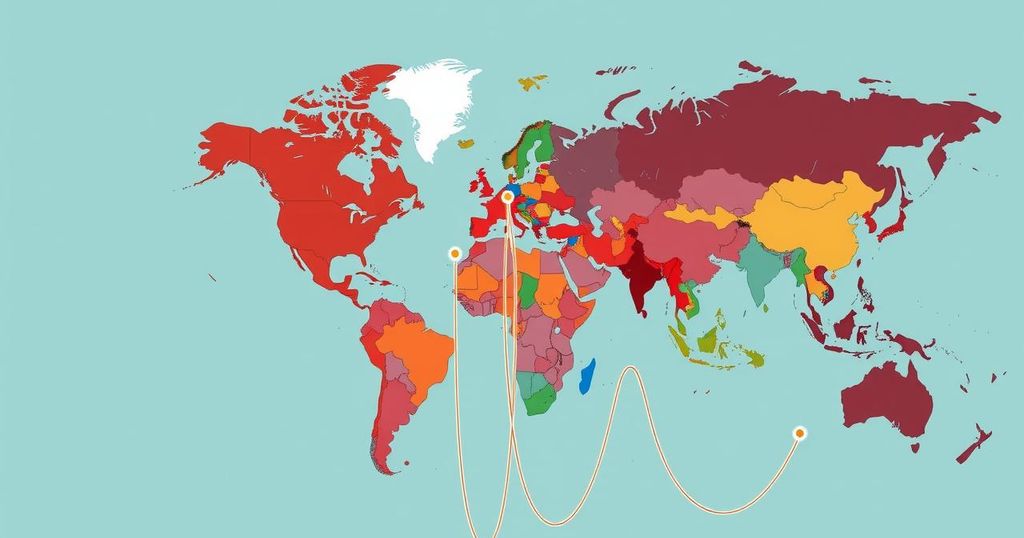Turbulence Ahead: Global Elections Reveal Voter Discontent in 2024
In 2024, voters across 70 countries expressed strong disapproval of incumbent governments, influenced by economic hardships and social inequality. Major political shifts occurred in democracies worldwide, with significant defeats for long-standing ruling parties. Simultaneously, the far-right gained traction, raising concerns about election integrity. The universal sentiment was one of frustration with existing political structures, underscoring the continuing turbulence in global democracy.
In 2024, a significant wave of electoral discontent swept across nations, leading voters in approximately 70 countries to express their frustration with incumbent administrations. Disruptions arising from the lingering effects of the pandemic, high inflation spurred by geopolitical tensions, and widespread social inequality fueled an anti-incumbent sentiment in democracies around the globe. Subsequently, traditional ruling parties in major nations faced significant challenges, resulting in historic losses and the emergence of new political forces.
Notably, the African National Congress in South Africa, which had dominated for three decades, lost its governing power and was compelled to form a coalition with opposition parties. Similarly, in India, Prime Minister Narendra Modi’s administration was ousted from majority control, marking a significant political shift in the world’s most populous democracy. Japan also witnessed a dramatic transformation in its political landscape, as the ruling Liberal Democratic Party faltered amid scandals that stirred public outrage. Other nations such as Ghana, Senegal, and Botswana also ousted long-standing governments, confirming a global trend toward political fragmentation.
Alongside these shifts, the rise of right-wing and populist movements further complicated the global political landscape. In key European nations, such as France and Germany, conservative populist parties gained traction, thereby challenging traditional political structures. In Romania, the presidential election was marred by allegations of foreign interference, illustrating the growing concerns regarding election integrity worldwide.
The democratic turmoil was not limited to established nations, as regions like South America and Africa experienced their own crises. In Venezuela, a political deadlock ensued amid claims of electoral fraud, while Mozambique saw violent protests following an alleged rigged election. In South Korea, political discord culminated in a controversial attempt to declare martial law, highlighting governance struggles in various parts of the world.
With numerous elections on the horizon for 2025, the situation remains precarious as numerous countries grapple with the consequences of political upheaval. As Seema Shah of the International Institute for Democracy and Electoral Assistance noted, public enthusiasm for democracy remains strong despite growing dissatisfaction with its practical implementation. The events of 2024 serve as a pivotal reminder of the fragility of democratic systems amid rising global tensions and the urgent need for political accountability.
The article discusses the notable electoral changes and challenges faced by incumbent governments across the globe during the tumultuous year of 2024, reflecting a widespread dissatisfaction among voters. With nations such as India, South Africa, and Japan experiencing significant political turnover, the text highlights the underlying issues contributing to the shifts, including lingering pressures from the COVID-19 pandemic, economic instability, and rising inequality. It also examines the rise of far-right movements and the threats posed by foreign interference during elections, showcasing a complex global political landscape.
In conclusion, the electoral landscape of 2024 was characterized by profound discontent among voters toward incumbent governments, with significant political shifts observed worldwide. The rise of populism, coupled with challenges to democratic integrity, raises pressing questions for the future of governance in numerous nations. As countries like Germany and Canada prepare for impending elections in 2025, the demand for political reform and accountability remains paramount, as citizens increasingly seek governance that aligns with their expectations and well-being.
Original Source: www.news4jax.com




Post Comment